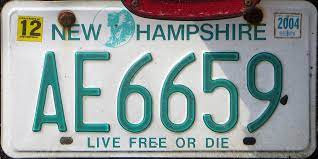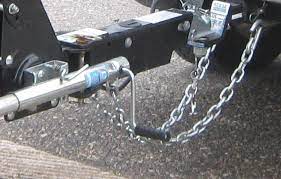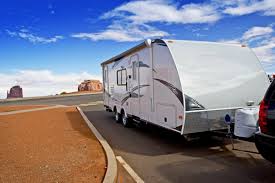New Hampshire Trailer Laws and Regulations
If you often find yourself towing heavy loads around your state you probably have some idea of the state laws and rules that apply to do this. Some people may not be aware however that sometimes laws can differ state by state. This can mean you might be legal in one state but crossing the border you might well get pulled over for an infringement you were not expecting.
In this article we are going to look at the laws for New Hampshire which may vary from the state you might be driving in from. There may also be regulations you were not aware of as a native to the state which might catch you out. So read on and let us try to keep you from costly tickets.
Do Trailers Need to Be Registered in New Hampshire?
If you are purchasing a utility trailer or camper in New Hampshire that has a Gross Vehicle Weight that is 3,000 lbs. or less you will require an original bill of sale. If the trailer does not have a listed Vehicle Identification Number (VIN) on the bill of sale you can instead acquire a VIN Verification Form TDMV 19A from the seller or the seller's permanent NH registration.
When you purchase a new trailer be it new or used you must immediately apply for a change of title. In New Hampshire it can take 40 – 50 after applying for your new title to arrive.

When towing a trailer you must have a copy of the towing vehicles license plate affixed to the trailer. You can have legal towing plates made with your vehicle's license number on them. If multiple vehicles may at various times tow the trailer you must make sure the correct plate is attached to correspond with the specific tow vehicle.
New Hampshire General Towing Laws
These are general rules in New Hampshire regarding towing that you might come foul of if you were not aware of them. Sometimes you may get away with an infringement of these rules because you did not know them but you can not assume this will be the case.
- Trailers and semi trailers must have safety chains or cables in addition to the primary connection between the tow vehicle and trailer. This is as a secondary precaution in the event that the primary coupling fails.
- Safety chains and cables must be strong enough to take the full load
- Towing of a broken down motor vehicle is prohibited by anyone other than professional tow truck operatives. In an emergency a non professional can tow a vehicle no more than a mile and only in order to remove the disabled vehicle from harm. The connection must also be such that no one has to steer the disabled vehicle.
- With a few exceptions such as agricultural vehicles no vehicle can tow more than two trailers or semi trailers at one time.

New Hampshire Trailer Dimension Rules
It is important to know the state laws governing the sizes of loads and trailers. You may need permits for some loads while others may not be allowed on certain types of roads.
- You can not ride in or live in a trailer while it is being towed along public roads in the state.
- The total length of tow vehicle and trailer is not specified.
- The maximum length of the trailer is 48 ft including bumpers.
- The maximum width for a trailer is 102 inches.
- The maximum height of a trailer and load is 13 ft 6”.
New Hampshire Trailer Hitch and Signal Laws
There are laws in New Hampshire that relate to the trailer hitch and safety signals displayed by the trailer. It is important to be aware of these laws as they are safety based so may carry potentially large fines.
In New Hampshire the ball hitch must either be mounted to the bumper or connected to the frame. A safety chain must also be used.
New Hampshire Trailer Lighting Laws
When you are towing something that will obscure the rear lights of your tow vehicle it is important to be able to communicate your upcoming and present actions in the form of lights. This is why there are rules regarding trailer lighting.
- When pulling a trailer you must ensure that the stop lamps are in working order at all times.
- Directional signals are required on trailers manufactured after January 1st 1952. If there are none this is an infringement of the law.
- Trailers that are driven after dark must have a red tail light which is visible from at least 1,000 ft and a white license plate light that can be seen from 50 ft.
- All tail lights must be between 20 – 72 inches above the road surface.
- Trailers over 3,000 lbs are required to display one amber reflector near the front and one red reflector near the rear. These reflectors should be between 24 – 48 inches above the road surface.
New Hampshire Speed Limits
When it comes to speed limits this varies and depends on the posted speeds of the specific area. You obviously should not exceed the posted speed limit in any area. When it comes to normal towing there are no specific different limits but it is expected that the speed is kept at a sensible level.
If your trailer is being caused to sway or lose control due to speed you may be pulled over even if you are within the posted limits. This is because the trailer may be posing a threat to public safety and you will be asked to slow down.
When towing a mobile home in New Hampshire the speed limit is 45 mph.

New Hampshire Trailer Mirror Laws
The rules for mirrors in New Hampshire are not specified although they are likely required and you may be pulled over if you do not have any or they are unusable. If your view is compromised by the width of your load you may want to consider extensions to your existing mirrors. These can be in the form of mirror extenders that slot onto already existing wing mirrors.

Any driver whose view of the road behind them is obstructed because of how their vehicle is loaded must have a mirror or reflector attached to their car that allows them to see the road clearly.
New Hampshire Brake Laws
The brakes on your tow vehicle and potentially on your trailer are important to the safety of any towing operation. Ensure that they meet state guidelines and adhere to the stated rules for use on the road with a trailer.
- If you are driving on the roads of New Hampshire while towing then your brakes must be in good working order.
- Any vehicle and trailer combination should be capable of coming to a full stop in dry conditions from s speed of 20 mph with 30 ft.
Conclusion
There are a number of laws in New Hampshire that pertain to towing and trailers which are designed to keep the roads and road users safe. The state of New Hampshire favors safety when towing so sets certain limits and demands that brakes be in good working order.
Link To or Reference This Page
We spend a lot of time collecting, cleaning, merging, and formatting the data that is shown on the site to be as useful to you as possible.
If you found the data or information on this page useful in your research, please use the tool below to properly cite or reference Tow Ratings as the source. We appreciate your support!
-
<a href="http://towratings.net/blog/new-hampshire-trailer-laws-and-regulations/">New Hampshire Trailer Laws and Regulations</a>
-
"New Hampshire Trailer Laws and Regulations". Tow Ratings. Accessed on April 24, 2024. http://towratings.net/blog/new-hampshire-trailer-laws-and-regulations/.
-
"New Hampshire Trailer Laws and Regulations". Tow Ratings, http://towratings.net/blog/new-hampshire-trailer-laws-and-regulations/. Accessed 24 April, 2024
-
New Hampshire Trailer Laws and Regulations. Tow Ratings. Retrieved from http://towratings.net/blog/new-hampshire-trailer-laws-and-regulations/.